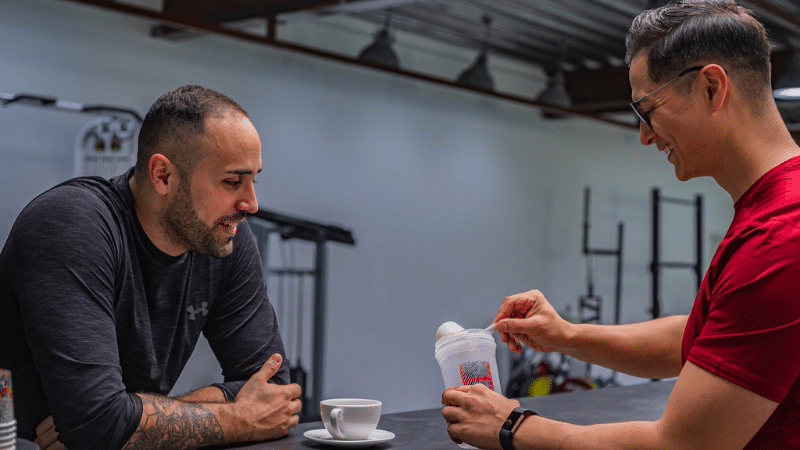When to Take Creatine—Comprehensive Guide for 2024

Researchers have done many studies on when to take creatine, and there’s no shortage of scientific evidence on the benefits of supplementing shortly before or after a workout. This guide focuses on the ideal time to take creatine, the best ways to take it, as well as its benefits and side effects. But first, let’s examine what exactly this substance is.
What Is Creatine and Why Take It?
Creatine is a substance in the body that provides energy for the muscles. About 95% of your body’s creatine is found in the skeletal muscle. To emphasize its importance, it’s safe to say you can’t do any heavy lifting or engage in high-intensity exercise without creatine to help your muscles keep the required momentum.
Creatine performs different functions in the body, without which you can’t lead a normal life. But when should you take creatine to fully reap these benefits? We’ll try to answer this question in our guide.
Taking Creatine on Workout Days
There are several options when deciding when you should use creatine on workout days. You can take creatine shortly before or after beginning your exercise or several hours before or after your workout. The available evidence suggests that creatine offers extra benefits when taken pre-workout. While the generally recommended gap is 30–60 minutes before exercising, there’s scarcely any research linking the effectiveness of creatine to the exact timespan between taking it and working out.
On the other hand, there are many studies that support supplementing shortly before or after a workout instead of taking creatine in the morning or evening. Notably, a 10-week study found that taking creatine close to a workout offers more benefits than doing so hours before or after exercising.
Taking Creatine Shortly Before a Workout
Some experts recommend taking creatine before working out because it can then replenish the creatine you use up by exercising. Taking it 30–60 minutes before a workout gives your body enough time to provide higher creatine levels for your workout. Hence, the best time to take creatine powder to replenish your reserves is before a workout.
Strength athletes and those who believe in this theory often use pre-workout supplements that contain creatine. For instance, it’s scientifically proven that combining creatine and caffeine increases power output during vigorous exercise.
The conflicting studies on the impact of creatine before and after a workout point out an interesting fact regarding the type of exercise you engage in. One study found pre-exercise creatine to be much less effective for those who do high-intensity cardio exercises. On the other hand, it makes a greater impact on resistance training workouts. A 5 g serving of creatine is the maximum you should take per session, as higher doses would take longer to digest. Your body needs to process it fast enough to be useful during your workout and minimize the risks of any side effects.
Taking Creatine Shortly After a Workout
According to a study published by the Journal of the International Society of Sports Nutrition, taking creatine after a workout yields better results than taking it before exercise. Among participants who took creatine before and after a workout, the latter group gained more lean body mass. This implies that when deciding when to take creatine for the best muscle gains, post-workout seems to be the answer, especially if you’re taking it alongside other post-workout formulas, like with a premium paleo protein powder.
This theory is backed by other studies. One such paper by the Canadian Science Publishing journal found that consuming creatine after a workout is more effective for improving body strength and composition than just resistance training. However, this study didn’t focus on comparing the effects of supplementing pre- and post-workout.
Another important discovery was that taking creatine immediately after working out increases muscular strength because participants who did it saw a dramatic increase in their bench press performance.
The Rationale Behind Taking Creatine Post-Workout
We’ve seen that taking creatine before working out increases muscle mass and strength. A good explanation for this is improved skeletal muscle blood flow during resistance training. This blood flow increases the amount of creatine that the muscles store. You also lose glycogen and other nutrients during a workout, and this increased blood flow puts the body’s cells in a position to replace these nutrients. However, most experts believe the best time to take creatine for muscle growth is post-workout.
Taking Creatine on Rest Days
Another important question many athletes ask is, Should I take creatine every day or just on workout days? You can supplement with creatine every day, and it’s safe for up to 48 months. The time of day to take creatine doesn’t matter on rest days. Taking creatine on a rest day replenishes your reserves for future use. In other words, taking creatine on rest days prepares your body to use creatine in the long run. Experts call this the “loading phase,” and it’s highly recommended for first-timers.
The maximum recommended dosage for a seasoned user is 5 g, but you can go as high as 20 g during the loading phase. This is the best time to take creatine for beginners, especially when repeated for about five consecutive days before a workout. Your body should be fully acquainted with creatine after the 5-day loading phase. So, the bottom line is that you can take creatine on rest days, especially if you haven’t been taking it before. But don’t expect the same benefits as a seasoned user taking creatine daily, shortly before or after a workout.
Optimal Time to Take Creatine
Should you take creatine before or after working out? According to some studies, taking creatine after exercising provides the most muscle mass and strength benefits. However, taking creatine before starting a workout also offers distinctive benefits, such as letting your body use much of it during exercise.
Still, the debate on the right time to take creatine is pretty complicated due to conflicting study results on this subject. Some found that taking it during a workout also provides benefits that you may not derive from taking creatine before or after a workout. In our opinion, shortly after a workout is the best time to take creatine for muscle gain.
Creatine and Caffeine Combination
Some people believe that caffeine interferes with our body’s creatine consumption and may lead to quicker fatigue. However, several studies have proved this idea wrong. Many results emerged to the contrary, supporting a combination of creatine and high-quality caffeine pills for increased stamina. Although it’s clear that the best time to take creatine for fat loss is shortly before or after a workout, you might want to time it differently when combining it with other ingredients.
Unfortunately, the combination was found to ramp up GI distress in athletes. Side effects like bloating, diarrhea, and stomach cramping may occur in some individuals who use both substances for a workout. That’s why you should first try a small dose of combined caffeine and creatine before going full throttle on it.
Myths About Creatine Timing
Some experts are categorically against taking creatine such a short time before your exercise due to the myth that it triggers dehydration and muscle cramps. The other reason is that those who take creatine before working out are more prone to injury. Thankfully, several researchers blew this myth out of the water, and you shouldn’t believe it.
In one such study, researchers analyzed injury rates among football players and found no significant links between cramping, dehydration, illnesses, or injuries among those who took creatine and those who didn’t. Considering these revelations, how often should you take creatine? The simple answer is that taking creatine regularly is the best way to benefit from it the most.
If you take creatine consistently, your body will build up enough reserves to benefit you during any workout, regardless of whether you take it pre- or post-workout. In fact, there’s no harm in putting creatine in your intra-workout shake and taking it during a workout, especially if you often forget to take creatine before a workout.
Creatine vs. Pre-Workouts
A question users ask fairly often is whether taking just creatine pre-workout is enough. The answer is no, because creatine isn’t an incredibly effective pre-workout on its own. Mainstream pre-workouts typically contain more than one ingredient, from caffeine to creatine, beta-alanine, BCAA’s, and everything in between. That said, on its own, creatine can’t provide the immediate energy boost that most athletes want in a pre-workout.
Pre-workouts don’t have a long-lasting effect like creatine and wear off within a couple of hours. But regular consumption of creatine builds reserves in your muscles that last a lot longer, enhancing future workouts. So, for those asking, How long should I take creatine? the answer is for up to 48 months at a daily 3–5 mg.
Similarly, pre-workouts don’t have even a remotely similar effect on muscle mass as creatine. This is why some pre-workouts are called pump supplements. These supplements increase blood flow to the muscles by accelerating nitric oxide production. This makes the muscles appear fuller and temporarily reduces fatigue, with no benefit for muscle mass.
We’ve emphasized how creatine compares to pre-workouts because of some athletes’ misconceptions about using creatine as a pre-workout. If you want a pre-workout in place of creatine, beware that its effects are relatively short-lived, and there’s usually no gain in muscle mass.
What Does Creatine Do?
Creatine has many other functions in the body than just improving muscle strength and mass. Below are some of the most important uses of creatine besides what’s already discussed.
Improves Athletic Performance
We’ve already pointed out the many athletic benefits of creatine in this guide. Its primary benefits are increasing lean muscle mass and strength.
Manages Creatine Disorder
Both children and adults need creatine to maintain a healthy metabolism. Taking creatine daily ensures you never run short or have creatine transport problems.
Helps Against Sarcopenia
Sarcopenia is a condition characterized by muscle loss caused by aging. A 12-week supplementation appears to help older adults develop stronger muscles, but it’s usually combined with muscle-building exercises to be more effective. You can take creatine at night or any other time when doing it for medicinal purposes.
Side Effects of Creatine
Although the maximum recommended dosage for creatine is 5 g daily, research shows that it’s safe to take up to 25 g daily for two weeks. Usage for longer periods is likely safe as negligible side effects have been recorded with daily 10 g dosing for up to 5 years. However, side effects may include dehydration, upset stomach, and muscle cramps—some of which you might be able to solve with potent digestive enzymes.
Conclusion
Creatine is a popular and thoroughly researched supplement in the strength exercise industry. While many are aware of its great athletic benefits, there’s plenty of confusion about the best time to take creatine for optimal results. The ideal time to take creatine for optimal results varies with your desired goals. To enjoy its health benefits, you could take creatine at any time. But if improving athletic performance is your intent, shortly after or before a workout is when to take creatine.






